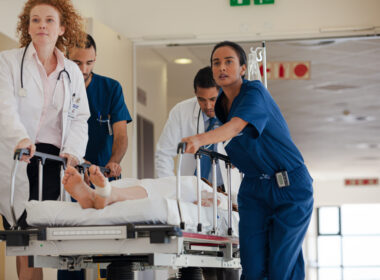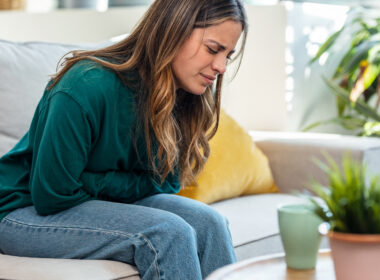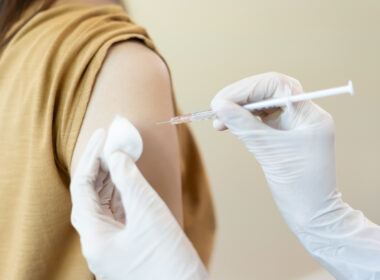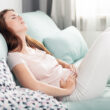Have you ever noticed you feel different physically and emotionally at different points in your menstrual cycle? For example, you might feel full of energy and optimistic at one point in your cycle while you might feel lethargic and low at another point.
If you chart your cycle with Fertility Awareness-Based Methods (FABM), you can know how your changing hormones contribute to these differences. This knowledge can help you better tailor how you take care of yourself emotionally and physically at the different points in your cycle. Since self-care is all about knowing how to best take care of yourself, knowing how each phase of your cycle affects you is invaluable. Think of it as a personalized self-care plan!
Your cycle is broken into four phases: follicular, ovulatory, luteal, and menstrual. During each of these phases, your hormone levels are different which affects how you are feeling physically and emotionally. Knowing what to expect during each of these phases can help you prepare ahead of time so you that you can implement the following self-care practices to help you feel your very best no matter what phase of your cycle you are experiencing.
(Please note that all information including in the following “What happens” sections are based on the information found in the book “Woman Code” by Alisa Vitti, HHC.)
Follicular Phase
What Happens During the Follicular Phase
During this phase of your cycle, which lasts seven to ten days, your ovaries prepare to release an egg. Your estrogen levels rise which triggers your uterine lining to thicken in preparation for the possibility to host a fertilized egg. Overall, you’re likely to feel energetic both physically and emotionally during this phase of your cycle.
Self-Care During the Follicular Phase
Since you are feeling energetic during this phase, you can take a more active approach to your self-care routine. Save the relaxing baths and lounging on the couch for another day and focus on getting out there and doing things. For example, go for an evening walk, hit the gym, visit a friend, or visit that museum you’ve been wanting to check out. Your self-care goal during this phase is to engage in the things that rejuvenate you and require you to be active. Since you have the energy, you may as well make the most of it, right?
Ovulatory Phase
What Happens During the Ovulatory Phase
This phase lasts about three to four days and, during it, hormone levels change which triggers a follicle, which contains an egg, to burst and travel through the fallopian tube into the uterus. As in the follicular phase, estrogen levels continue to rise so that the uterine lining continues to thicken. Overall, you will continue to feel energetic and will be stable mood-wise. In fact, during this phase, you will likely feel the most energetic out of all of the stages in your cycle.
Self-Care During the Ovulatory Phase
Like in your follicular phase, you’re most likely feeling energetic in your ovulatory phase. Practicing self-care will probably feel the easiest in this phase because you have the energy to invest in a dream self-care routine. Focus on getting those workouts in, spending time with friends and family, and engaging in your favorite leisure activities and hobbies. For example, if you love skiing, this a great time to hit the slopes because your energy levels are high. Or, if you love going to sporting events, check out tickets in your area and gather a few friends together to go. Explore the adventurous side of self-care during this phase.
Luteal Phase
What Happens During the Luteal Phase
During the luteal phase, which last approximately ten to fourteen days, the hormone progesterone rises which signals to the body to keep the uterine lining intact. Estrogen levels also continue to rise. If the egg has not been fertilized, progesterone production drops until it halts which will trigger the start of your period. During this phase, your energy levels will decline and you may start to experience premenstrual symptoms such as bloating, irritability, and certain cravings.
Self-Care During the Luteal Phase
Since your energy levels are starting to decline, snuggling up on the couch with a good book or taking a relaxing bath begins to sound much more appealing than going out for a brisk walk or going through an intense workout at the gym. And that’s okay. An important component of self-care is recognizing what you need without judgement. It’s not “bad” that you aren’t feeling as energetic. Rather, it’s just what happens during this phase in your cycle.
Instead of fighting it or beating yourself up over feeling tired, work with your body and take it easy. Don’t feel up to your usual workout? That’s okay. Try going to the gym for a shorter amount of time and doing a less intense workout. Another great self-care option during this phase is setting up a coffee (or tea) date with a friend. It doesn’t require a lot of effort or energy but you still feel like you are out and about doing things.
Menstrual Phase
What Happens During the Menstrual Phase
This phase lasts anywhere from three to seven days and is triggered by a drop in progesterone production (which started during the luteal phase). This change triggers your period to start which is the shedding of your uterine lining. Once your lining has been shed, estrogen levels begin to rise again as your body starts the whole cycle all over again. You may experience cramping and other symptoms when your period starts.
Self-Care During the Menstrual Phase
This phase can be tough, especially if you have difficult or painful periods. Self-care during this phase is all about taking it easy. When you are dealing with the symptoms of your period, it’s important to make sure you aren’t overwhelming yourself. For example, it’s especially important to not overschedule your calendar so that you can minimize your exposure to stress. And, if you don’t feel up to your usual activities and commitments, give yourself permission to stay home and rest.
As you can see, knowing what to expect during each phase of your cycle can help you tailor your self-care routine to how you are most likely feeling emotionally and physically during that time. While I’ve provided here an outline of the different phases of a cycle, it’s worth learning a Fertility Awareness-Based Method from a certified FABM instructor to equip you to read your body’s unique signs throughout the cycle. (You may even discover a health condition that deserves attention). Along your healthcare journey, the most important thing for you to do is to get to know yourself, both mind and body, because only you know what is best for you. Using this personalized approach to self-care can help you experience the benefits of self-care no matter where you are in your cycle.
References:







